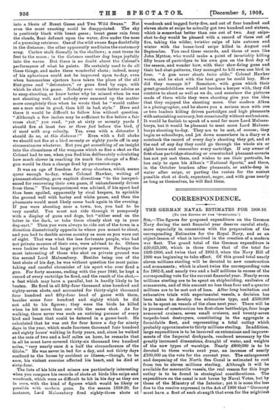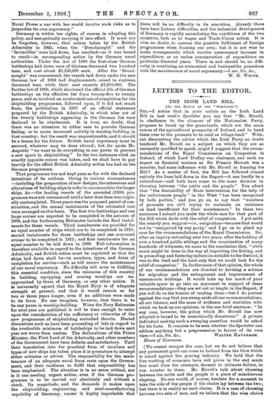CORRESPONDENCE.
THE GERMAN NAVAL ESTIMATES FOR 1909-10. uro TUX EDITOR OF TIIII -SeiscrATou....1
SIR,—The figures for proposed expenditure on the German Navy during the next financial year deserve careful study, more especially in connexion with the preparation of the corresponding Estimates for the Royal Navy, and as an object-lesson of what is involved in the creation of a modern war fleet. The grand total of the German expenditure is £20,023,500, which is three times that of the total for 1899-1900, and twice that of 1902-3, when the Navy Bill of 1900 was beginning to take effect. Of this grand total nearly eleven millions sterling will be devoted to new construction and armaments ; which is about twice the corresponding vote for 1902-3, and nearly two and a half millions in excess of the corresponding vote for the current financial year. Nearly seven millions sterling are to be spent on shipbuilding, exclusive of armaments, and of this amount no less than four and a quarter millions are to be met out of loan. After long hesitation and exhaustive trials with experimental vessels, a decision has been taken to develop the submarine type, and £500,000 is to be spent on vessels of the class next year. There will be in process of construction ten first-class battleships, four large armoured cruisers, seven small cruisers, and twenty-seven torpedo-boat destroyers, constituting in the aggregate a formidable fleet, and representing a total outlay which, probably approximates to thirty millions sterling. In addition, large expenditure is to be incurred on extensions and improve- ments of the Imperial dockyards, rendered necessary by the greatly increased dimensions, draught of water, and weights of the new types of warships. Nearly £800,000 is to be devoted to these works next year, an increase of nearly £100,000 on the vote for the current year. The enlargement and deepening of the North Sea Canal is estimated to cost from ten to eleven millions sterling. Although it will be available for mercantile vessels, the real reason for this huge outlay is to be found in strategical considerations. The expenditure an the canal is not borne by Naval Votes, but by those of the Ministry of the Interior; yet it is none the less due to the resolve expressed in the Act of 1900 that" Germany must have.. a fleet of such strength that even for the mightiest Naval Power a war with her would involve such risks as to jeopardise its own supremacy."
Germany is within her rights, of course, in adopting this policy, and energetically carrying it into effect. It must not be forgotten, however, that action taken by the British Admiralty in 1905, when the 'Dreadnought' and the ' Invincibles ' were laid down, has resulted—as it was bound to result—in corresponding action by the German naval authorities. Under the Act of 1900 the first-class German battleships laid down were of thirteen thousand two hundred tons, and cost about £1,250,000 each. After the ' Dread- nought' was commenced, the vessels laid down under the new German law of 1906 had displacements raised to eighteen thousand tons, while their cost exceeds 21,800,000. The further law of 1908, which shortened the official life of German battleships on the effective list from twenty-five to twenty years, and so involved an accelerated rate of completion for the shipbuilding programme, followed upon, if it did not result from, the publication in 1907 of an official statement prepared by the British Admiralty, in which nine out of the twenty battleships appearing in the German list were declared to be obsolescent. It is true, no doubt, that there was no intention in either case to provoke German feeling, or to cause increased activity in warship-building in that country ; but the result was unquestionable, and it should be a lesson for the future. British naval supremacy must be secured, whatever may be done abroad; but (to quote Mr. Asquith) "we want to do everything in our power to prevent a new spurt in shipbuilding." In the two instances cited an exactly opposite course was taken, and we shall have to pay heavily for the effect British Admiralty action has had on the German programme.
That programme has not kept pace so far with the declared intentions of its authors. Owing to various circumstances —including the preparation of new designs, the extensions and alterations of building-slips in order to accommodate the larger ships, &c.—the leading vessels of the amended (1906) pro- gramme were not commenced until a later date than was origin- ally contemplated. Three years was the proposed period of con- struction, and the annual instalments of the estimated cost were arranged on this basis. The first two battleships and one large cruiser are expected to be completed in the autumn of 1909, and the forthcoming Estimates include the final instal- ments for these vessels. Third instalments are provided for an equal number of ships which are to be completed in 1910; second instalments for three battleships and one armoured cruiser to be completed in 1911; and first instalments for an equal number to be laid down in 1909. Full information is therefore available in regard to the intentions of the German Admiralty, and British action must be regulated so that the ships laid down shall be—in numbers, types, and dates of completion for service—such as will ensure the maintenance of our naval supremacy. No difficulty will arise in fulfilling this essential condition, since the resources of thi13 country in building, equipping, and arming warships are un- approached by those of Germany, or any other nation. It is universally agreed that the Royal Navy is of adequate strength at present, and that it would remain so for two or three years longer, even if no additions were made to its force. No one imagines, however, that there is to be any pause in warship-building. When the Navy Estimates for next year are published it will be time enough to enter upon the consideration of the sufficiency or otherwise of the new programme of shipbuilding embodied therein. Heated discussions such as have been proceeding of late in regard to the irreducible minimum of battleships to be laid down next year are worse than useless. The deelarations of the Prime Minister, the First Lord of the Admiralty, and other members of the Government have been definite and satisfactory. Until their translation into the practical form of numbers and types of new ships has taken place it is premature to attempt either criticism or advice. The responsibility for the main- tenance of an adequate naval force rests upon the Govern- ment, and their readiness to fulfil that responsibility has been emphasised. The situation is in no sense critical, nor is it one needing urgent action, even if the German pro- gramme is to be carried out absolutely and without a check. Its magnitude, and the demands it makes upon the shipbuilding, engineering, and steel-manufacturing capability of Germany, render it highly improbable that
there will be no difficulty in its execution. Already there have been Labour difficulties, and the industrial development of Germany is rapidly assimilating the conditions of the two countries, both as to wages and Trade-Union action. It is wise, no doubt, to assume the possible fulfilment of foreign programmes when framing our own; but it is not wise to make arrangemeuts which involve unnecessary increase in expenditure, or an undue concentration of expenditure on particular financial years. There is, and should be, no diffi- culty in combining an economical and businesslike procedure with the maintenance of naval supremacy.—I am, Sir, &c.,
W. H. WHITE.







































































 Previous page
Previous page